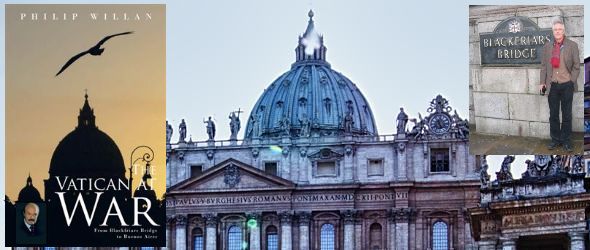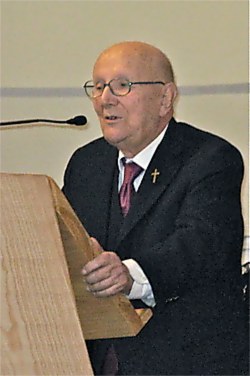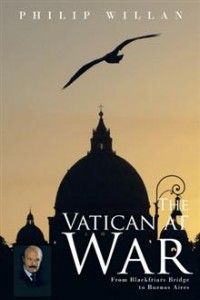
Author, journalist and long time Italy resident Philip Willan recently sent me a copy of his new book: The Vatican at War: From Blackfriars Bridge to Buenos Aires. Willan also kindly agreed to answering a few questions about his book and my interview with him follows shortly.
Personally, I found The Vatican at War fascinating, even if the plot is devilishly complex and it can be hard to keep up with all the names at times. Fortunately, Willan thoughtfully included a ‘Cast’ section at the start of the book and I found this very handy when I came across names with which I was not familiar.
Here, then, is my interview with Philip Willan:
Alex Roe: Can you tell Italy Chronicles’ readers a little about yourself?
Philip Willan: I am a freelance journalist and author and have lived in Rome for more than 40 years. I was first here as a child because my father was a tropical forester who worked at the Food and Agriculture Organisation for 16 years.
A.R: Now, why did you write the Vatican at War and why did you choose such a title?
P.W: I was originally asked to write the book by a British publisher, after they saw an article by me on the Calvi case in the Guardian.
It was a good topic for me, as I had done research for David Yallop’s book ‘In God’s Name’ and for Charles Raw’s ‘The Moneychangers’, and had met Calvi’s son Carlo through Raw.
Constable & Robinson saw ‘The Last Supper’ as a true crime story very much focused on the murder of Roberto Calvi. I think the most interesting thing about the story, though, is the way it fits into a context of Cold War intrigue, especially given the fact that the Italian judicial system failed to solve the murder and the five original suspects were all ultimately acquitted. I decided to update and expand the original book because I wanted to get it published in the United States. It’s partly an American story, about the anti-communist activities of the CIA, and the new title reflects the broader historical perspective, which, to my mind, is the book’s real appeal.
A.R: Who, in your opinion, should read your book?
P.W: If you have already read ‘The Last Supper’ you can perhaps be excused from reading ‘The Vatican at War’. I have updated the original version with the results of the three levels of the Calvi murder trial and more information on the possible connection to the kidnapping of the Vatican schoolgirl Emanuela Orlandi. But I have also added two new chapters, on the resignation of Pope Benedict, whose pontificate collapsed under the weight of scandals inherited from the past, and on the election of Pope Francis, who is attempting to free the church from the shadow of the past and return it to its original mission.
People interested in the role of the Catholic church during the Cold War – a topic not much studied so far – should find it interesting, as should any Catholic who wants to understand the challenges that confront the new pope now.
A.R: As readers will discover, you go into great detail on the Calvi case and the late Italian banker’s links to the Vatican bank, the mafia, and a number of politicians, including Silvio Berlusconi. The case isextremely complex. Have any more details emerged recently?
P.W: In the last chapters I bring readers up to date on what has happened to some of the protagonists of the story in recent times.
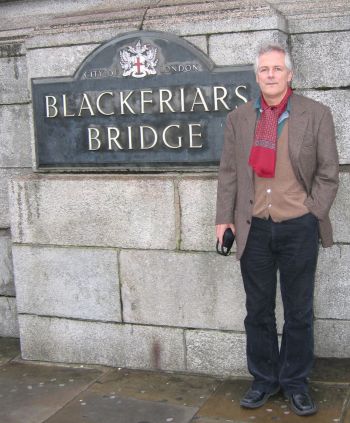
Characters such as Elio Ciolini, Flavio Carboni, and Ernesto Diotallevi seem to have an abiding attraction to trouble. It is being reported today that police have seized 25 million euros worth of assets, including a 14-room apartment near the Trevi Fountain, from Diotallevi, a Rome businessman with alleged links to the Banda della Magliana who was accused of helping to organize Calvi’s ill-fated journey to London. It has also been reported that the prosecutor in the Calvi murder case has opened an investigation into at least four new suspects, so there could be further developments on that down the line.
A.R: I was struck by the number of names in your book which are still being mentioned in Italy today. Does it surprise you that some of these people still hold positions of power?
P.W: Italy has not shown itself to be good at confronting and clarifying its past. There seems to be no universally accepted, cross-party consensus about the more controversial aspects of its recent history. Judicial and parliamentary investigations into the P2 masonic lodge, for example, have not established beyond doubt whether or not membership was something that people should be ashamed of.
Silvio Berlusconi and his party colleague Fabrizio Cicchito were both on the membership list, but it hasn’t prevented them from being protagonists in Italian political life right up to today.
A.R: My impression from your book is that the Cold War is still not over in Italy. Would you agree with this assessment?

Stop reading, start speaking
Stop translating in your head and start speaking Italian for real with the only audio course that prompt you to speak.
P.W: I think what happened during that difficult time, when Italy was home to the largest Communist Party in the West, still casts a long shadow. The consequences of shameful acts and shameful complicities still conditions people today, though when Berlusconi evokes a “Red Menace” to try and win elections I think there are ever fewer people who are likely to take the message seriously.
A.R: The Vatican does not come across as being a force for good. My feeling is that if Pope Benedict had not resigned, the Roman Catholic church may have imploded, and this may still happen. Do you think Pope Francis will be able to prevent the meltdown?
P.W: The financial and sex abuse scandals have definitely tarnished the brand. I heard not long ago that priests in some parts of once Catholic Ireland were afraid to walk down the street in clerical garb for fear of being assaulted. I think Pope Benedict was simply overwhelmed by the problems, some of which had their roots in the intrigue dating from Roberto Calvi’s time.
I think Pope Francis has done an excellent job so far and has been helped by the timing of his election: if the plight of the church had not become so grave he would probably have faced much stiffer resistance from its reactionary elements.
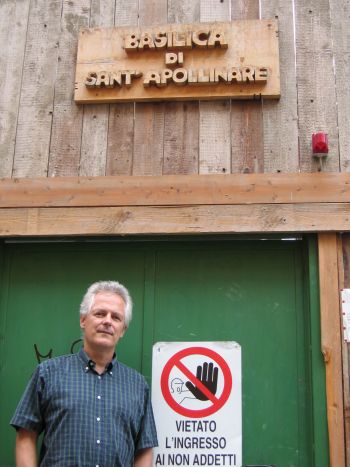
A.R: Does the Vatican frighten you?
P.W: I was brought up a Catholic and always thought it inconceivable, at least in modern times, that the consecrated followers of Christ could constitute a physical threat to anyone. So I continue to be surprised when well-informed Italian colleagues warn me to be careful when dealing with topics such as the Vatican bank.
It is striking that Ettore Gotti Tedeschi, a recent president of the IOR, was deeply concerned about his personal safety at the time when he was ousted.
A.R: A cryptic response, if ever there was one! Next question.
A.R: Do you believe Pope Francis’ life is at risk?
P.W: A lot of people in Italy tend to draw a parallel between the reformist Pope Francis and the short reign and mysterious death of his predecessor, Pope John Paul I. His decision to live surrounded by other people in the Domus Sanctae Marthae may be a sensible security precaution, as well as a reflection of his sociable nature.
A.R: Did you receive any threats while writing the Vatican at War?
P.W: When I wrote my first book, ‘Puppetmasters’, on the manipulation of terrorism in Italy during the Cold War, it was easy to become paranoid and I did receive a number of elliptical references to my personal safety while I was working on the research. Equally though, I believe foreign reporters are less at risk than our Italian colleagues, and I remember once being told by an expert that I should have no problems provided I didn’t use the information I acquired to blackmail people! I was never threatened while working on ‘The Vatican at War’ and sensitive aspects of the story, at least the ones I am aware of, are gradually sedimenting into ancient history.
A.R: Finally, do you have any other books in the pipeline?
P.W: My next book will be on the Moro case, to my mind the Everest of Italian political mysteries!
A.R: Yes indeed, the Moro case is yet another ocean of unanswered questions. I shall look forward to that. Many thanks for your time Philip.
Philip Willan’s book, The Vatican at War, is available from Amazon.com:
The Vatican at War: From Blackfriars Bridge to Buenos Aires – the Kindle ebook version.
The Vatican at War: From Blackfriars Bridge to Buenos Aires – paperback.
For more information on Philip Willan and his work, you can visit his website: Philip Willan
—
Photographs kindly supplied by Philip Willan.


